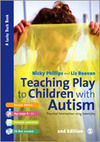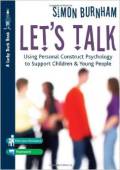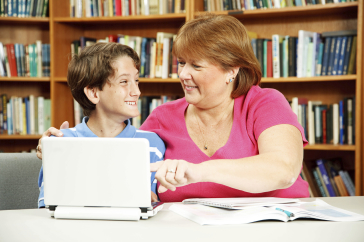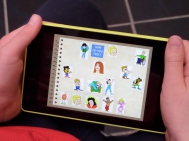
Bright ideas
We've published a range of research and produced many resources over the years that we have been working as educational psychologists. Some of these have been aimed largely at academic audiences and have been published in peer reviewed journals. Many have been written or devised with practitioners in mind and these have been published as books or made available as file downloads and handouts at training courses and conference presentations.
Below are some of what we think are the best of our own 'bright ideas'. We're grateful for the collaboration with colleagues that made some of them possible.
Nicky's book about teaching play to children with autism, written with head teacher Liz Beavan, is now in its second edition because the first edition sold so well. It was also nominated for a nasen book award. The book explains how to use Identiplay and the bundled CD ROM (remember them?) includes training slides and video clips of children working with adults using the materials described in the book.
We offer training linked to the ideas and the materials in this book.
Simon's book about helping to elicit children's views and hear their voices is very timely in the light of the recent and very welcome emphasis on placing young people at the heart of person centred planning. The book includes a CD ROM (see above) with an interactive PowerPoint presentation to help hard-to-engage children to share their thinking. There's a free version of this presentation below.
We offer training based on the themes of 'pupil voice' and the use of personal construct psychology linked to this book.
This is the original Let's Talk that was in use for a number of years before the book of the same name was written and published. This version was developed through many meetings with children who gave feedback about its contents. Let's Talk is an engaging way of structuring a conversation with a child or young person that is particularly suitable for children who might be reluctant or find it difficult to say much about themselves in ordinary conversation.
It also offers a number of opportunities for adults to explore children's thinking in more depth through self-descriptions, scaling questions and target setting.
Let's Talk was designed to be used on a laptop or netbook in a shared session with a child or young person. Where IT equipment is not available it's possible to print the slides and use these as the stimulus for conversation.
The presentation on the book's CD ROM was based on this one but we think the original's better, so why not buy the book and download this version for free!
Let's Talk will also run well on any tablet that can open and read PowerPoint files.
This picture shows a slightly modified version of Let's Talk with fewer and larger pictures, optimised for the smaller tablet screen on a Kindle Fire 6.
This is a chapter from a free multi-author ebook about Personal Construct Psychology.
The PCP Pack SBSB.pdf
Adobe Acrobat document [748.2 KB]
Have you had the feeling that life is becoming a little harder to predict and that the pace of change has increased in recent years?
We had that feeling and began writing this book in 2017, pulling together answers to the many questions that we are typically asked as educational psychologists and acknowledging the considerable and changing pressures on schools, children and families. Eventually published in 2019, What's Happening to Education? covers topics such as dyslexia and literacy difficulties, intelligence testing and cognitive ability, learning disabilities, children's mental health, ADHD, autism, screen time and self esteem.
We discuss issues that were receiving relatively little attention at the time we were writing but have since become more widely discussed, including the falling birth rate, the greater negative impact of social media on girls than on boys, and changes in the nature of aggression shown by children.
However, the speed of change that in part prompted us to write What's Happening to Education? means that it contains no mention of Artificial Intelligence. In only a few short years AI has raised serious questions about the viability of some traditional degree courses, disrupted the assessment of coursework and homework assignments in secondary schools and colleges, and removed some entry-level job opportunities for young people moving from education into employment. If you work in education and you are not talking about AI every day then we wish you the best of luck and you will certainly need it.
And of course no mention of Covid or the children who have not returned to school since the pandemic. If we ever write an updated edition there will be a lot more to say!
Simon was interviewed about the book on the Schoolosophy podcast in 2021.






